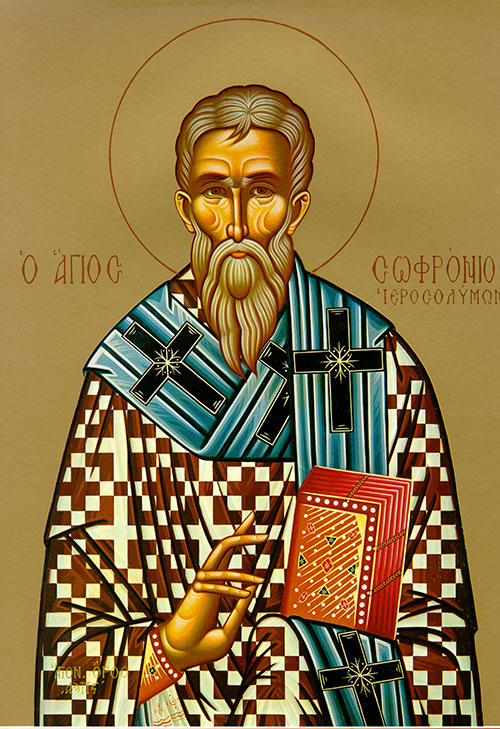

Our venerable father Sophronius was born in Damascus around 560. From his youth he was distinguished for his piety and his love for classical studies. He was especially proficient in philosophy, and so he was known as Sophronius the Wise. The future hierarch, however, sought the true philosophy of monasticism, and conversations with the desert-dwellers. He went to Jerusalem to the monastery of St. Theodosius. After the death of St. Modestus in 634, St. Sophronius was chosen Patriarch of Jerusalem. He toiled much for the welfare of the Jerusalem Church as its primate. Toward the end of his life, St. Sophronius and his flock lived through a two year siege of Jerusalem by the Moslems. Worn down by hunger, the Christians finally agreed to open the city gates, on the condition that the enemy spare the holy places. But this condition was not fulfilled, and St. Sophronius died in grief over the desecration of the Christian holy places. Written works by Patriarch Sophronius have come down to us in the area of dogmatics, and likewise his “Excursus on the Liturgy,” the Life of Saint Mary of Egypt, and also about 950 troparia and stikheras from Pascha to the Ascension, including the prayer for the solemn blessing of the water on the Feast of the Theophany.
O guide of the true faith, mirror of piety and commendable behavior, bright star of the universe, and adornment of pontiffs, you enlightened us all by your teachings. O wise Sophronius, inspired by God and lyre of the Holy Spirit, intercede with Christ our God that He may save our souls.
You advanced by heavenly fervor and spread the true dogma by your lips. You ruled your Church well and reformed the monks within it. You clearly preached words of instruction for us, and so we sing to you, O blessed patriarch: Rejoice, luminous glory of the faithful.
Genesis 13: 12-18
Abram settled in the land of Canaan, while Lot settled among the cities of the Plain and moved his tent as far as Sodom. Now the people of Sodom were wicked, great sinners against the Lord.
The Lord said to Abram, after Lot had separated from him, “Raise your eyes now, and look from the place where you are, northward and southward and eastward and westward; for all the land that you see I will give to you and to your offspring forever. I will make your offspring like the dust of the earth; so that if one can count the dust of the earth, your offspring also can be counted. Rise up, walk through the length and the breadth of the land, for I will give it to you.” So Abram moved his tent, and came and settled by the oak of Mamre, which are at Hebron; and there he built an altar to the Lord.
Proverbs 14:27 – 15:4
The fear of the Lord is a fountain of life, so that one may avoid the snares of death.
The glory of a king is a multitude of people; without people a prince is ruined.
Whoever is slow to anger has great understanding, but one who has a hasty temper exalts folly.
A tranquil mind gives life to the flesh, but passion makes the bones rot.
Those who oppress the poor insult their Maker, but those who are kind to the needy honor him.
The wicked are overthrown by their evildoing, but the righteous find a refuge in their integrity.
Wisdom is at home in the mind of one who has understanding, but it is not known in the heart of fools.
Righteousness exalts a nation, but sin is a reproach to any people.
A servant who deals wisely has the king’s favor, but his wrath falls on one who acts shamefully.
A soft answer turns away wrath, but a harsh word stirs up anger.
The tongue of the wise dispenses knowledge, but the mouths of fools pour out folly.
The eyes of the Lord are in every place, keeping watch on the evil and the good.
A gentle tongue is a tree of life, but perverseness in it breaks the spirit.
Icon courtesy of Jack Figel, Eastern Christian Publications – ecpubs.com
Sunday, March 10 –